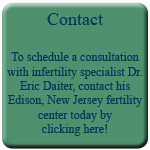Ovulation and Trying to Get Pregnant
A couple trying to get pregnant should have frequent intercourse (to increase the likelihood of exposing the egg to motile sperm) just prior to and immediately following ovulation. Despite the attention on “trying to get pregnant,” ideally stress levels will remain low and the couple will keep things as natural as possible.
The post-ovulation phase of the menstrual cycle is characterized by elevated progesterone concentrations, and if a pregnancy does not develop within two weeks (14 days) of ovulation then the progesterone levels fall and the menstrual cycle flow begins. Therefore, ovulation takes place about 14 days prior to the onset of the next menstrual flow. If menstrual cycle intervals are every 28 days, then ovulation usually occurs on cycle day 14; and if menstrual cycle intervals are every 45 days, then ovulation usually occurs on cycle day 31. Tests to determine the time of ovulation can be useful if the menstrual cycle intervals are completely unpredictable, and these include ovulation predictor kits, blood work for estradiol and LH, and serial ultrasound exams for follicular growth.
Fertility medications to induce ovulation or enhance ovulation can be considered if spontaneous ovulation is very rare or extremely irregular. Consultation with an infertility doctor should be considered prior to deciding on fertility medications.
Dr. Eric Daiter at The NJ Center for Fertility and Reproductive Medicine, LLC is board certified in Reproductive Endocrinology and Infertility and he has over 20 years of clinical experience with ovulation problems and menstrual irregularities. Dr. Daiter would be happy to help you. For an appointment to discuss your situation with Dr. Daiter, please call the office at 908 226 0250. Please visit us on the web at http://www.drericdaitermd.com http://infertilitytutorials.com and http://www.ericdaiter.com
